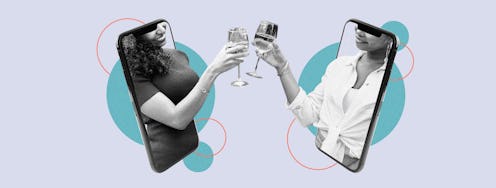Life
“We Try To Keep It Normal”: Amid The Coronavirus Outbreak, People Flock To Online Parties

Sabina Hitchen, a New York City-based publicist in her 40s, is excited about her upcoming double date this weekend. She and her husband have a few wine options and are looking forward to an evening of adult conversation away from their infant daughter. They just hope the WiFi holds up.
As social distancing restrictions become more far-reaching to slow the spread of the coronavirus, Zoom dates and Google Hangout parties are becoming less novel and more essential for socializing and maintaining a sense of well-being. Unsurprisingly, according to Evite, virtual events are up 90% in March 2020 compared to March 2019. And people who are adapting say it doesn’t feel as weird, stiff, or work-like as one might think.
Although many already use FaceTime to check in on far-flung friends and family, what’s different this time is adding others you don’t usually see on screen — and the heightened anxiety. Enter: the theme event.
Nicole Wyman, 32, a creative strategist in Brooklyn, is attending a virtual cocktail party on Thursday evening. Pajamas aren’t allowed; dressing up is encouraged. “It’s an excuse to get out of our sweats and get done up,” says Wyman, adding that she also has Netflix parties on her calendar using the Netflix Party interface.
While theme events may seem forced, they can help you focus on what’s normal — instead of all the things that aren’t — and can provide balance, says mental-health coach Matt Grzesiak, Ph.D. “Talk to others about your feelings, doubts, fears — let them all out,” he says. “Then, you can opt for something for fun while staying connected.”
We try to keep it normal, like we would if we were in person.
That’s why Hitchen is also creating an almost-daily “family dinner” with her sister’s family as well as their elderly parents. Each home puts an iPad on the table, sits down for their meal at the same time, and talks about their days. “A COVID-19 case was confirmed in the building we live in, so it’s impossible not to discuss,” says Hitchen. “But we also try to keep it normal, like we would if we were in person.”
Jenny S. Gerson, a 34-year-old novelist in Atlanta, Georgia, connected with a friend to give virtual tours of each other’s neighborhoods, walking together and pointing out different sites through FaceTime. As social distancing restrictions grow, this may not be as feasible, but Gerson plans to keep finding ways to connect. “Even a drop-in where both of us are making dinner or corralling the kids can be a way to talk and catch up on all the craziness that’s going on,” Gerson says.
And while calendars may be full of mandatory virtual meetings during the work day, companies and industries are having success with optional “happy hours” and networking events. Ketchum, a global communications consultancy, recently organized an optional virtual dance party, hosted by a senior creative with killer playlist sensibilities. More than 100 employees, including the global CEO, entered the event and danced to Robyn’s “Dancing On My Own,” Beyonce’s “End of Time,” and other dance-themed tracks. On-screen cameos included pets and kids, and Ketchum has more parties in the works.
Emily McGill, a 30-something theatrical publicist in New York, was part of a salon dinner series that invited people connected to the theater business to discuss a question that was meant to be disagreed upon. The initial event had been planned to be a live dinner at the end of the month; organizers quickly pivoted to change it to virtual.
Invitees were asked to set up a meal and a cocktail in their home while they debated the question: As creators, what is our job during this dumpster fire? “Being asked to disagree is key,” says McGill, who says the series was inspired by the Jeffersonian Dinner format and that she found the inaugural event invigorating.
“It was so good to be able to hear different perspectives and connect,” she says. “Plus, I could fill my rosé whenever I wanted.”